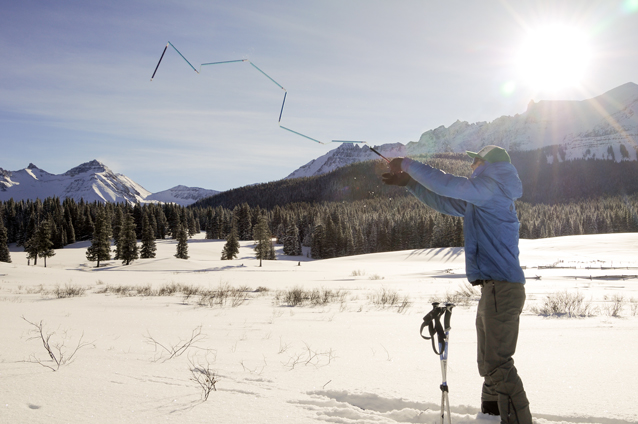



Never heard of Arva? You’re probably not alone. Ask most backcountry skiers in the U.S. and chances are good that they haven’t heard of this little French company, either. But, ask the same question in Europe, and you’ll find out that Arva is a household name with 30 years of experience in the avalanche equipment industry.
Arva’s goal is to provide solid and functional beacons, probes, shovels and other avalanche safety gear at an affordable price for the recreational consumer (as well as ultra light avy gear for ski-mo racers). We tested out the Evo4 Beacon and the Light 2.40 Compact Probe in the backcountry terrain outside of Telluride, Colorado and found there were pros and cons to both products. Here’s the full scoop:
![]()
Images via Matt Zia

While the beacon itself is intuitive and user friendly, the harness is not. In fact, the harness system is the major design flaw in the Evo4 package. Attached to one end of the shoulder strap is a red tab that must be inserted into the corner of the beacon in order for it to turn on. When this tab is removed from the beacon, it shuts off, without making any sounds. Furthermore, when conducting a fine search and holding the beacon close to the snow surface, the user is forced to either unclip the waist belt and use the shoulder strap like a lanyard, or remove the shoulder strap and use the stretchy waist belt to guide their search. Both of these options are time-consuming and cumbersome and still don’t provide the user with enough mobility to conduct a proper fine search. However, if the beacon is used without the harness and, instead, worn in the pocket, then many of these harness-related issues could be avoided.
Best For: Beginner to intermediate backcountry skiers looking for an affordable beacon
PROS:
CONS:


In addition to its compact size, this probe relies on a Kevlar cord tensioning system (in lieu of a steel cable and plastic lock system) to keep it at an ultra-light 200 grams. At first, deployment with this system seemed cumbersome, because in order to lock out the probe you have to slot the knotted cord into a notch on the end of the probe. After several attempts, this process did eventually become more intuitive, but, if you are in the heart-racing situation of probing for a buried avalanche victim, you want a system that’s foolproof. The probe is equipped with markings every 5cm and length callouts at every 10cm, which is helpful for measuring the depth of the snowpack, but not for doing an in-depth snowpack analysis. Lastly, the probe features a rounded tip, which performed well in soft snow, but had a hard time breaking through old crusts deep in the snowpack.
Best For: Fast and light backcountry travelers, use in light snowpack

PROS:
CONS:
For more avalanche safety gear, check out 12 of our top backcountry picks.